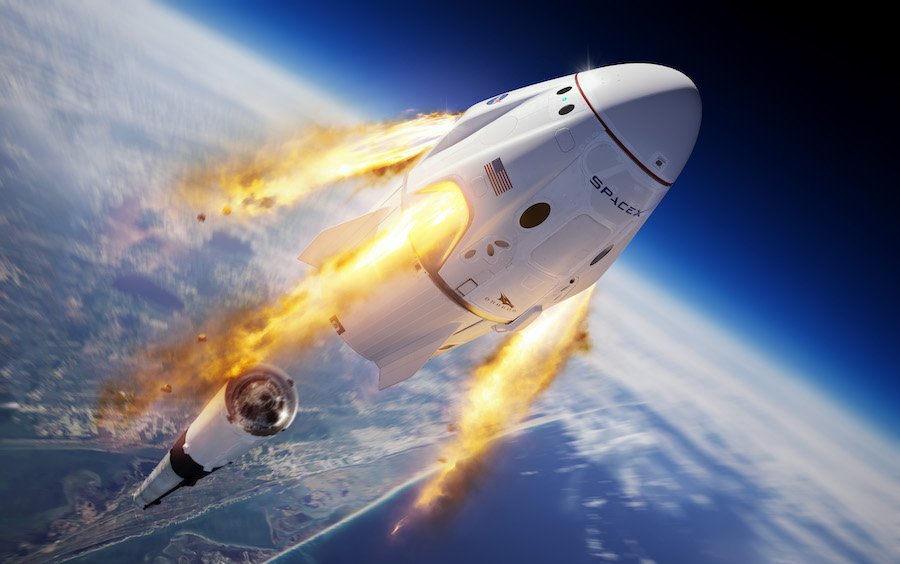In light of the most recent rocket failure, NASA is keeping a careful eye on possible “schedule impacts” for its next manned flight onboard SpaceX. This was raised after a rare anomaly on July 11 during a Starlink satellite launch on SpaceX’s Falcon 9 rocket raised concerns. The satellites ended up stuck in an odd orbit because the second stage of the rocket did not operate as intended. The timeline for the International Space Station (ISS) mission is being scrutinized while SpaceX and the Federal Aviation Administration (FAA) look into the event.
The Falcon 9 rocket is also used for sending NASA astronaut missions to the ISS via SpaceX’s Crew Dragon spacecraft. The next mission, dubbed Crew-9, was slated to send four astronauts to the ISS in mid-August. These astronauts are set to replace the Crew-8 team, which has been on the ISS since March on what was expected to be a six-month mission. NASA officials emphasized that “Crew safety and mission assurance are top priorities for NASA.” They added that they would “provide updates on agency missions including potential schedule impacts, if any, as more information becomes available.” SpaceX, the statement mentioned, has been sharing information with NASA as the anomaly investigation continues.
ISS missions typically last six months and have some flexibility built into their schedules, allowing for longer stays if necessary. However, SpaceX is currently the only fully certified spacecraft capable of sending astronauts to space from U.S. soil. The other option, Boeing’s Starliner, is not yet approved for operational ISS launches. Currently, a test mission known as Crew Flight Test is on the ISS with two astronauts. While Starliner is certified for emergency returns to Earth, it has faced significant issues, including helium leaks and thruster problems after its June 6 docking with the ISS. Initially planned as a 10-day mission, the Crew Flight Test has had its landing date postponed indefinitely due to these complications.
In addition to crewed missions, SpaceX is responsible for a portion of the vital resupply missions to the ISS through its Cargo Dragon spacecraft, which also uses the Falcon 9 rocket. The most recent docking of Cargo Dragon, SpaceX’s 30th, occurred on March 4, delivering food, supplies, and experiments for the Expedition 70/71 crew. There are alternative spacecraft for sending cargo to the ISS, such as Northrop Grumman’s Cygnus and Russia’s Progress. The next Progress launch is scheduled for August 15, according to the Russian federal space agency Roscosmos.
SpaceX’s Falcon 9 rocket failure has broader implications beyond ISS missions. The company is also set to launch a commercial astronaut mission called Polaris Dawn later this month, using the Crew Dragon and Falcon 9. This mission, funded by billionaire Jared Isaacman, aims to conduct a high-orbit mission above Earth, featuring the first commercial spacewalk. Isaacman previously flew on SpaceX’s Inspiration4 mission in 2021, using the same vehicles. Isaacman expressed confidence in SpaceX’s ability to address the recent anomaly. “SpaceX has an incredible track record with Falcon 9. I can say from personal experience they are very transparent when issues arise,” Isaacman said in a post on X, formerly known as Twitter. “I have no doubt they will arrive at a cause quickly and ensure the most cost-effective and reliable launch vehicle keeps delivering payload to orbit. As for Polaris Dawn, we will fly whenever SpaceX is ready and with complete confidence in the rocket, spaceship, and operations.”
The Falcon 9 rocket’s recent failure is a rare occurrence, given SpaceX’s history of reliable launches. The anomaly during the Starlink satellite mission has nonetheless raised concerns about the upcoming Crew-9 mission to the ISS. NASA and SpaceX are collaborating closely to investigate the issue and determine its cause, ensuring that future missions can proceed safely and on schedule. NASA’s cautious approach reflects the critical importance of crew safety and mission success. The potential delay of Crew-9 underscores the challenges of space travel and the need for rigorous testing and validation of all systems involved. As SpaceX works to resolve the issue, the space community watches closely, aware of the high stakes involved in manned space missions.
The Crew-9 mission is particularly significant as it represents the ongoing partnership between NASA and SpaceX, a collaboration that has revitalized American spaceflight capabilities. This partnership has allowed the U.S. to send astronauts to space from its own soil, reducing reliance on international partners and fostering advancements in space technology. The successful resolution of the Falcon 9 anomaly will be crucial for maintaining the momentum of this collaboration. Both NASA and SpaceX are committed to ensuring the safety and success of their missions, which continue to push the boundaries of human space exploration. As the investigation progresses, updates from NASA and SpaceX will provide critical insights into the path forward for Crew-9 and other upcoming missions.
The necessity of dependability and safety in space missions is demonstrated by NASA’s attentiveness after the Falcon 9 rocket failure. SpaceX and the FAA are still looking into the anomaly, so the Crew-9 mission and other planned launches are still being closely monitored. The incident highlights the difficulties involved in space travel and the continuous efforts needed to guarantee the well-being and safety of both spacecraft and astronauts.
If you like the article please follow on THE UBJ.
